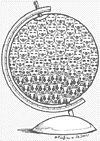
In her latest book, A Poetics of Impasse in Modern and Contemporary American Poetry (The University of Alabama Press, 2005), Susan M. Schultz says:
"I have only gestured at a much larger body of poetic evidence responding to the events of 9/11, and to the wars in Afghanistan and Iraq. Suffice it to say that this is not a poetry of "ease", as Oren Izenberg calls it, noting how little of it there is these days. Izenberg, in a Boston Comment: Avant-Garde Debate, argues that contemporary poetry has lost "a range of feeling," and is dominated by a sense of humiliation, however wryly and comically expressed by poets. Transpose "humiliation" to "anger" and you do have the tone, or the origin, of much contemporary experimental poetry; this is not an age of ease, and its poets cannot impose ease upon dis-ease. But the poetry of seams that poets describe enables them to "construct", literally and figuratively, a world out of the pieces."
In his book Im Weltinnenraum des Kapitals. Für eine philosophische Theorie der Globalisierung (Suhrkamp, 2004) the German philosopher Peter Sloterdijk states (my translation):
"The infamous sputter on genius and creativity, that wanders about artistic Europe since the end of the fifteenth century, is proof of the inability of the modern human being to form a meaningful opinion on one's own spirit of enterprise."
I wonder how much of the "anger" actually springs from the "inability"? I guess a lot.

No comments:
Post a Comment